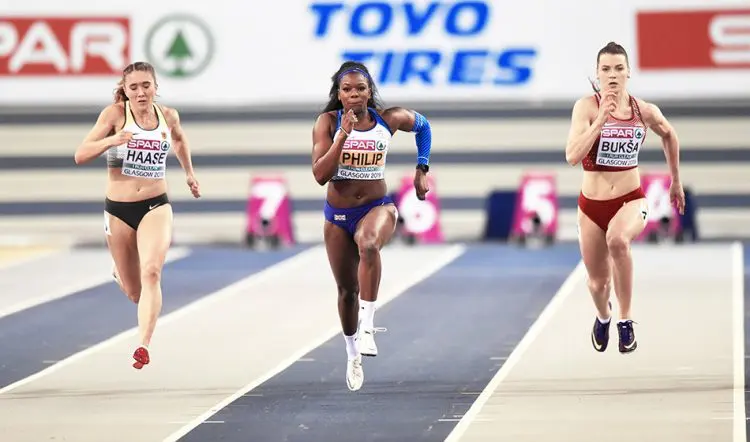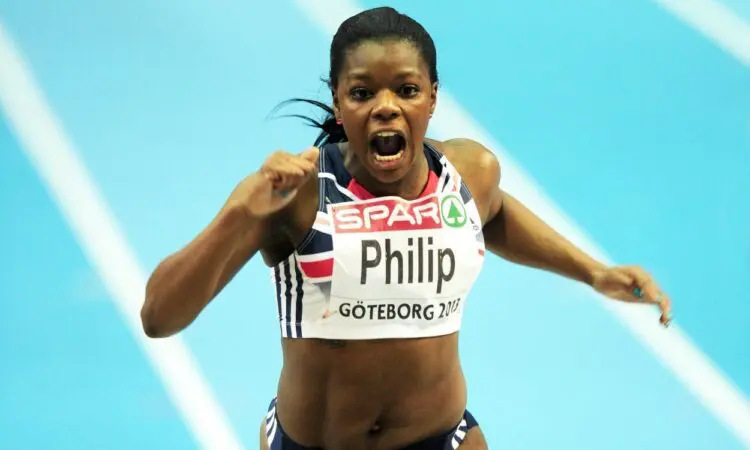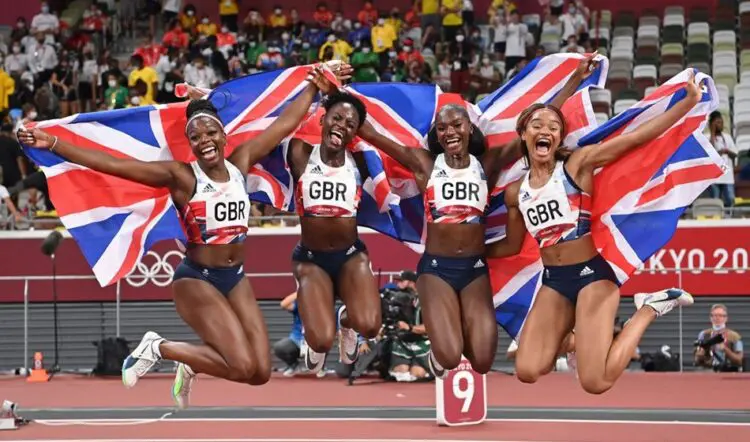Sprinter talks to Ben Bloom about her role in helping Britain’s next generation of athletes, tackling the World Relays Championships and what might lie ahead as she reached the latter part of her career
When Asha Philip first emerged on to the senior global stage more than a decade ago, she was thankful to the likes of Christine Ohuruogu and Jeanette Kwakye for taking her under their wings and helping her become accustomed to the cauldron of professional athletics. Now, as the senior stateswoman of the British sprinting set-up, it is her turn to do the same for the next generation.
Of the seven-strong British women’s 4x100m squad for this month’s World Athletics Relays in Guangzhou, three were still in primary school and another just a year into secondary school when Philip won her first senior international title at the 2014 European Championships.
While that quartet were busy in education, Philip was steadily accumulating medals: two Olympic, three world, six European and three Commonwealth. Aged 34, she has seen it all and done it all in the sport, gaining an abundance of wisdom to impart.
“When the new ones come in you have to help them out a bit,” she says. “I got it when I was growing up so you want to give the same effect to somebody else. It is quite daunting, especially when you’re seeing athletes you’ve seen on TV are now in the lane next to you. So I’ll just make sure they feel at ease.”
Just do not expect her to rule with an iron fist. “Everyone knows my personality,” she says. “I’m just here to have a good time. Life is too short, so I’m the one that will make sure they have the best time of their lives – but within limits.

“I’m a good/bad influence – a cheeky one. They still have to explore, they are young and want to enjoy the experience. But don’t run away with it. I’m going to give you an inch, don’t take that mile.”
From the dark days of failing to qualify a women’s 4x100m team for the home London 2012 Olympics, Britain’s female sprinters have formed an irrefutable powerhouse, habitually making podiums at almost every international competition since.
The culmination of that growth was last summer’s Olympic silver in Paris – their best result in the event for 68 years. Philip, so often the lead-leg runner courtesy of her lightning-fast start, was there in the Stade de France, but holding a microphone rather than a baton.
She had been part of the British team that secured Olympic qualification at last year’s World Athletics Relays and then regained their European title later in the summer. But, despite her unrivalled relay experience, she was not picked for what would have been her third Olympics.
After Philip finished fifth over 100m at the British Championships, the selectors opted to take the first four over the line that day (Daryll Neita, Amy Hunt, Imani-Lara Lansiquot, Desiree Henry), plus Dina Asher-Smith and Bianca Williams. It was a decision that stung, but one that Philip quickly came to terms with.

“They picked who they believed,” she says. “With any athlete you’re not going to agree with the decision that was made. But what was done, was done, and I had to basically move on. When one championship comes, it goes, and then you focus on the next one.
“It wasn’t great missing out on an Olympic Games, but I went there to do broadcasting instead so I had a whale of a time in that way. I just had to get on with it.”
The unexpected television gig came courtesy of Eurosport, for whom she shared athletics duties with presenters Iwan Thomas and Radzi Chinyanganya. Despite Philip’s lack of experience, it was a natural fit for a drama university graduate.
“I think I’ve got the face and banter for it,” she says, with a laugh. “It was a great experience and so much fun being on the other side [of the camera].”
It did, though, mean the slight awkwardness of standing trackside when her regular 4x100m team-mates followed the United States home in second place.
“I still wanted them to do well,” says Philip. “I knew how hard they’d worked and the stress behind the scenes, so it’s not like I didn’t want them to succeed. Obviously I wanted to be on that track, but I liked where I was standing. It was just a bit weird.”

Now, at the first available opportunity, she is back. Following a brief indoor season limited to America (where she trains in Florida) and an outdoor opener last month, Philip – who has always remained on British Athletics funding – will return to her usual starting spot in a largely youthful World Athletics Relays squad.
The dual goals from a competition that is tangibly more relaxed than others on the calendar are to help young athletes gain experience in the senior ranks and qualify the team for this summer’s World Championships. It is there that Britain’s female sprinters will turn their attention to winning more medals. “It’s always got to be top three,” says Philip. “I wouldn’t take anything less.”
This month’s event in China also presents a new challenge for sprinters, with the addition of a mixed 4x100m ahead of its inclusion at the 2028 Los Angeles Olympics. Unlike its 4x400m equivalent, which initially allowed teams to choose their own order before set rules were belatedly introduced, the 4x100m will always see the first two legs run by women and the latter two by men. Philip remains unsure about asking athletes to tackle an additional discipline in the existing time period of a major championships.
“It’s very weird,” she says. “The mixed 4x400m was more exciting when you could pick your order and have 6ft 6in men running with a 5ft 5in woman. That was quite entertaining. Now they’ve set the order, it doesn’t have that extra edge.
“For the 4x100m I think it does make sense, because I couldn’t have Zharnel Hughes running down that second leg and me trying to collect that baton in third. That would be extremely scary.
“But they just keep adding events for athletes in the space of the same weeks. When do you want them to compete? With the mixed 4x400m it’s at the beginning [of the programme], but the people who have the individual [400m] aren’t going to be in it. Not everybody can be a Femke Bol. It just doesn’t make sense. They are trying to spice up the sport. Whether that’s the right way, I don’t know.”
Which naturally begs the question: what should the authorities be doing instead?
“If they want to spice up the sport they need to entertain the crowd differently,” says Philip. “The [American football] Super Bowl has a massive half-time show and everybody talks about it. Do something like that. You want to make sure you have entertainment to make sure you have the best show alive. Killing us on the track isn’t the way forward.”
As the sole nation to win medals in all five Paris Olympics relay events, the inclusion of a sixth is only likely to add to Britain’s haul come Los Angeles in three years’ time. One thing Philip is certain of is that she will not be there; at least, not running.
“I couldn’t go to 2028, that’s crazy,” she says. “I’ll be on the sidelines with [TV presenter] Radzi.”

In a career that saw her crowned European 60m champion in 2017, Philip also made Olympic and world 100m semi-finals as an individual, as well as narrowly missing out on the podium three times when finishing fourth over 100m at the European Championships and Commonwealth Games.
While a last individual international outing came three years ago, an opportunity to race solo is one of her remaining goals, alongside consigning to history the horrific cruciate ligament injury suffered aged 16 at the Trampoline World Championships which ended her gymnastics career and halted athletics for three years.
“No one just runs to do relays,” says Philip, whose 100m personal best of 11.10 dates back to 2015 and 2019. “The whole point is to do individual events that we work hard for. So that would be nice. I always want to run faster and would love a PB. Going sub-11 would make my day.
“I want to leave on my terms, due to leaving trampolining in not the greatest of positions. I would like to leave the track in a better condition.”
Based in Florida after seeking renewed inspiration following the Tokyo Olympics, Philip has started boosting her CV with one eye on future endeavours. As well as forming part of the British Elite Athletes Association board and European Athletics Athletes Committee, she is currently undertaking a masters in international sports management at the Global Institute of Sport.
So when does she envisage calling time on her running career? “It’s a big question. I think I’ll just know. It could be this year, it could be next year, but we’ll see.”
Before then, she intends to help the next generation following in her illustrious footsteps. And, of course, have a good time along the way.
